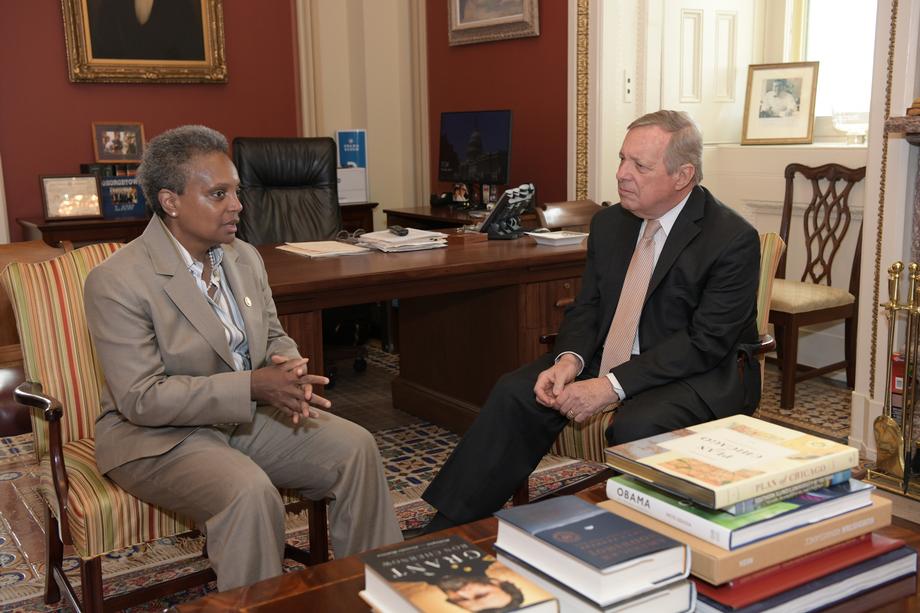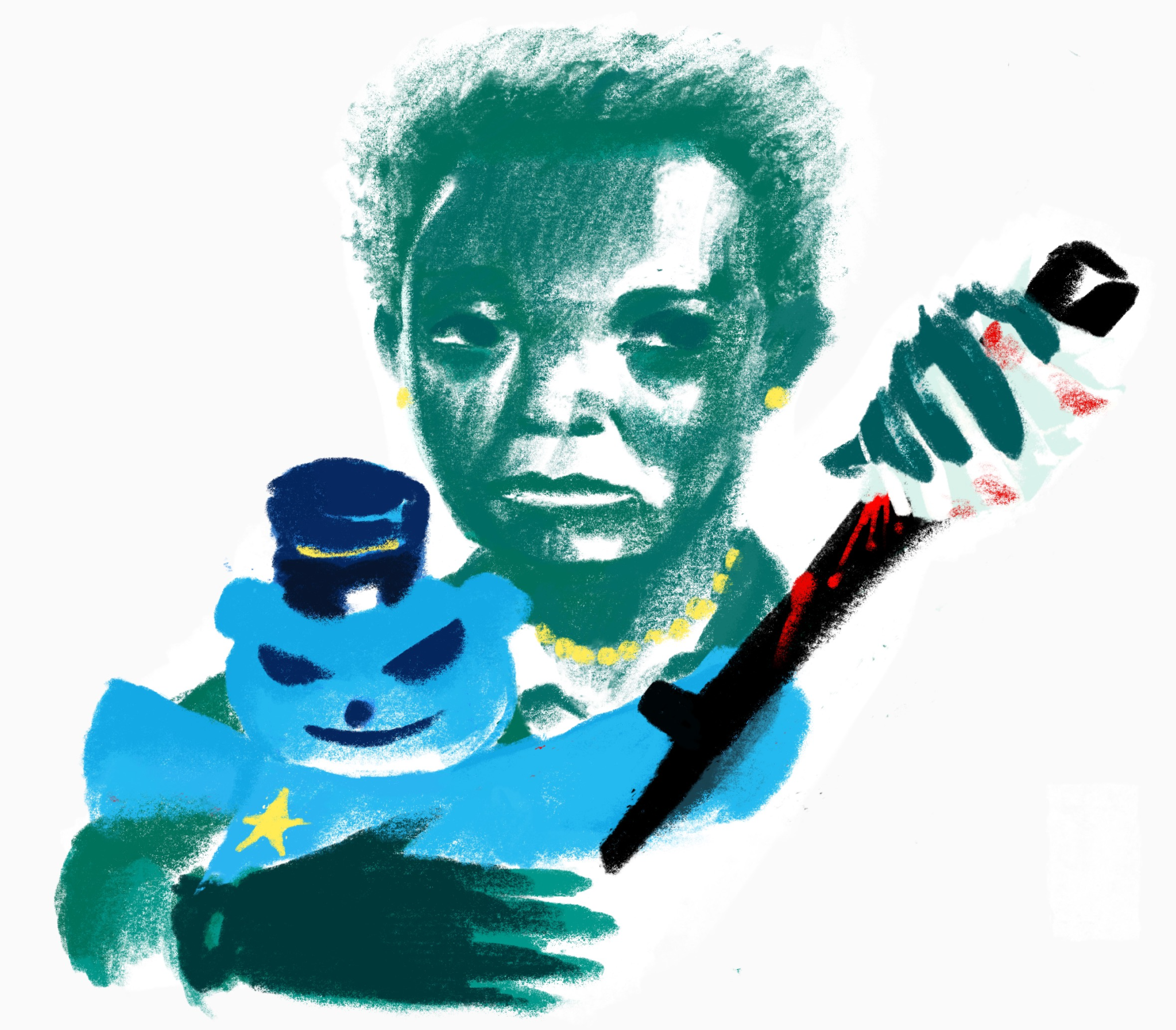Despite widespread grassroots and legislative momentum toward ending qualified immunity, the practice that protects police officers from being personally sued for civil rights violations, documents reviewed by the Weekly indicate Mayor Lori Lightfoot and her staff were already lobbying against efforts to ban the practice last summer.
On March 25, the Illinois House Restorative Justice Committee advanced legislation to end qualified immunity. Two states have banned it, and the George Floyd Justice in Policing Act, which was passed by the U.S. House of Representatives and endorsed by President Joe Biden in his April 28 address to Congress, would limit it in every state. In Illinois, the SAFE-T Act, a wide-ranging criminal justice reform bill signed into law by Governor J.B. Pritzker in February, established a task force to “review and reform” qualified immunity.
The documents—emails between Lightfoot and staff—indicate that in July 2020, the mayor instructed her staff to “gather data” on qualified immunity to prepare for “the push during budget to ‘defund’ the police, and efforts underway in Springfield,” according to one.
The mayor was likely referring to last year’s efforts by grassroots groups and some City Council members to reduce the CPD’s outsize share of Chicago’s budget, as well as legislative efforts last year to enact statewide reforms in policing.
The emails also revealed that civil rights lawsuits due to police misconduct have cost the City more than $500 million since 2009, while individual officers were responsible for paying about $2 million in settlements. The emails were published online by the group Distributed Denial of Secrets.
The communications indicate the mayor’s staff prepared data to present to U.S. Senator Dick Durbin’s staff regarding those issues. In public, Lightfoot—who included police reform as a pillar of her 2017 campaign for mayor—has remained tight-lipped about qualified immunity. Privately, her staff were apparently lobbying Durbin’s office to convince him qualified immunity is not a roadblock to holding police officers accountable for misconduct.
“There is a suggestion that the Legislature is going to push for stripping away qualified immunity because the plaintiffs’ bar is falsely claiming that police officers are never held accountable,” the mayor wrote. She directed her staff to consider how to present data on how much the City has spent on “police settlements, judgments and attorneys’ fees” in misconduct and civil rights lawsuits, apparently to bolster her case.
While preparing to meet with Durbin’s staff about the issue, the mayor’s staff gathered data on how many federal civil rights lawsuits (or “FCRL”) had been dismissed because of qualified immunity in 2019. That year, according to emails between the mayor and her staff, there were two such dismissals. “FCRL has 100s of cases,” one email from a staffer to the mayor read.
The mayor’s office also engaged the City’s corporation counsel to draft an analysis of police lawsuits between 2009 and 2019, apparently in an effort to prove the case for keeping qualified immunity. While the resulting analysis was unable to include information about individual officers being held accountable for misconduct, it did detail the collective cost of CPD’s civil rights violations to the City.
The results, according to an email from a member of the mayor’s staff, were “eye-opening.”

The Weekly reviewed a spreadsheet on CPD lawsuits prepared for the mayor’s office and a summary of the report’s findings sent to staffers by then-Chief Risk Officer Tamika Puckett. Lightfoot originally hired Puckett—who resigned in November 2020 after eighteen months on the job—to curb the City’s massive spending on police misconduct settlements.
The payouts detailed in the spreadsheet range from hundreds of dollars to hundreds of thousands, and include allegations of illegal searches, false arrests, unwarranted car stops, harassment, and brutality. One settlement for $11,000 stems from a lawsuit alleging officers arrested a man in 2014 and took him to the notorious interrogation site at Homan Square, where they strip-searched him while threatening him with a Taser and stuck a gun in his mouth.
Another, settled for $100,000, accused the police of falsely arresting a Jackson Park man in November 2019 and having “shot their puppy ‘Duce’ twice.”
In a $200,000 settlement, the police were accused of ransacking a house in 2019 and breaking “many items” while “shielding themselves” from a home security camera.
Taken together, even the smaller settlements reveal the many ways Chicagoans are disparaged and abused, or have their lives irrevocably disrupted, in encounters with police.
One $500 civil rights settlement in 2018 stemmed from allegations that detectives stopped a man as he exited a store, made him remove his pants and shoes, and accused him of selling drugs.
In a lawsuit settled for $1,500 in 2017, police stopped a man and impounded his car; lacking transportation, he had to quit his job.
A $3,000 settlement in 2017 went to a plaintiff who said “unknown officers” physically abused him after transporting him from Cook County Jail to the Fifth District police station.
It is unclear whether any of these incidents resulted in terminations or other disciplinary action for the police officers involved. According to one email from a deputy corporation counsel in response to a request for such data from Puckett, that department does not “keep info” of how many police disciplinary cases result in recommendations such as placement on administrative duties or termination. Apparently, because CPD alone had data on the consequences to individual officers for their misconduct, it was omitted from the report.
But the collective consequences—the cost of these lawsuits to the City—were detailed in a summary of the report that, together with the spreadsheet, show a steady stream of settlements for the misconduct of sworn officers who are shielded from personal liability by qualified immunity even as they upend the lives of Chicagoans.
The report and related emails appear to indicate the mayor was working to protect qualified immunity last summer.
In another exchange about the issue, Michael Frisch, the mayor’s then-senior advisor and legal counsel, wrote that Lightfoot was looking for a data visualization showing what the City had paid out in police-related settlements, judgments, and attorney fees in CPD lawsuits. Frisch’s email made clear the data collection was designed to help the mayor and her staff “make the argument against those seeking to limit qualified immunity.”
“The point she wants us to get across is that qualified immunity is NOT preventing plaintiffs lawyers from receiving compensation for their clients when they sue the city,” Frisch wrote. “We have 500-600 civil rights cases pending against us at any one time, and so the qualified immunity defense only affects a very small percentage.”
In an email on August 6, 2020, Puckett sent the report summary to others on the mayor’s staff. She reported that 2,272 federal civil rights cases against the department were adjudicated between 2009 and 2019. Such cases made up fifty-one percent of CPD settlements during that ten-year period. Police settlements accounted for half of all federal civil rights payouts by the City, and about eighty-four percent of the total cost.
Seventy-seven percent of federal civil rights lawsuits were settled between 2009 and 2019 for a total of more than half a billion dollars, according to the summary: “Total damages paid arising from FCRL cases between 2009 and 2019 cost $511,878,676.34.” Taxpayers shouldered that cost.
The total civil-rights punitive damages—which cops are personally responsible for paying—were $2,014,500, the summary says.
“The bottom line is, due to State Law and the CBA [Collective Bargaining Agreement], cops rarely feel the sting of their own misbehavior in their own pocketbooks,” Frisch wrote.
Editor’s note: On May 7, after this story was published online, the City acknowledged the breach of emails, which they reportedly became aware of on February 11, in a news release.
Jim Daley is the Weekly’s politics editor. He last co-interviewed Cook County Public Defender Sharone Mitchelll, Jr.


THE MAYOR’S TWISTED LOGIC CO$TS US!
This is incredible reporting. WOW!